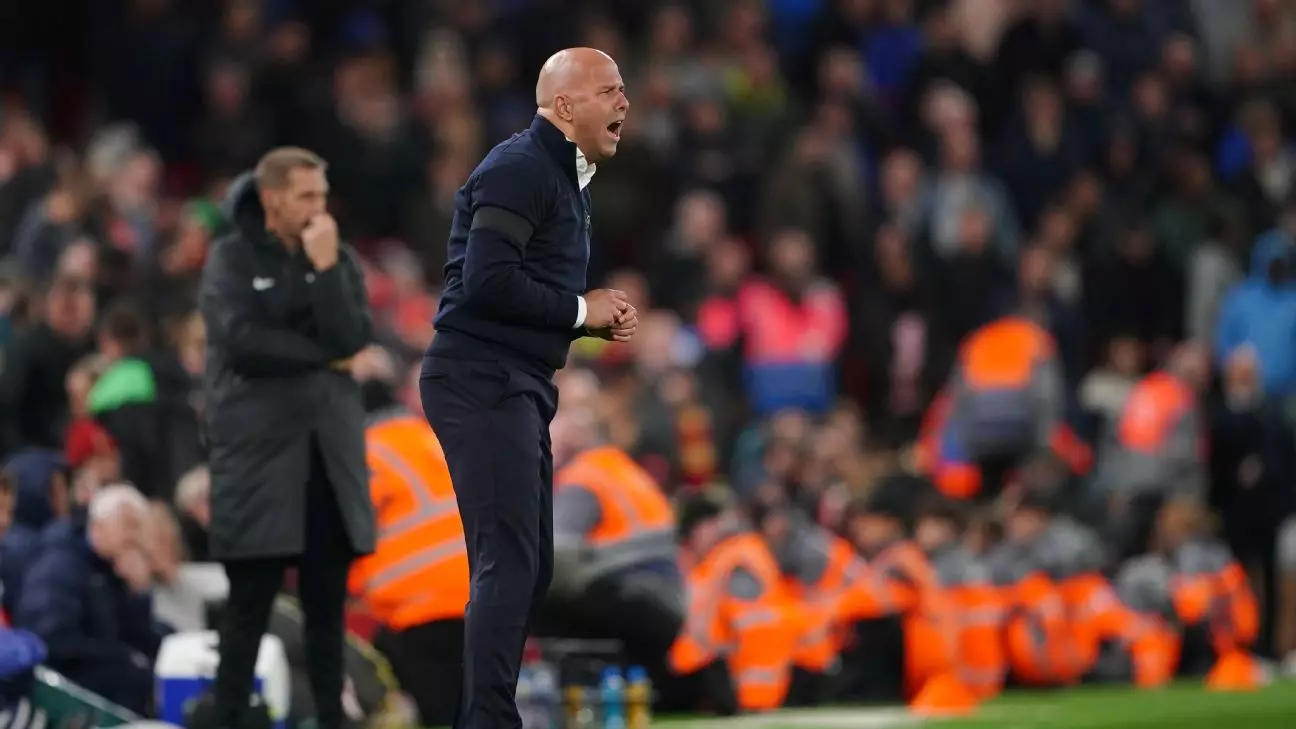In every football match, the players, coaches, and fans contribute to an intricate tapestry of drama, excitement, and tension. However, one component often overlooked is the role of the referee, who must navigate both the technical decisions of the game and the emotional currents flowing from the crowd. Following Liverpool’s recent 2-1 victory over Chelsea, Arne Slot—former manager of Feyenoord—expressed how the Anfield atmosphere impacted the officiating decisions made by referee John Brooks. This raises critical questions about referees‘ roles, the influence of fan engagement, and whether a more favorable environment for players can lead to a more straightforward match for officials.
Slot’s remarks regarding Brooks’s questionable decision-making highlighted a fascinating dichotomy between the players‘ performance and the officiating. During the match, several significant moments tested both the referee’s judgment and the team’s resilience. The early booking of Tosin Adarabioyo for pulling back Diogo Jota set a precedent for how rigorously the game would be contested. Then, the award of a penalty to Liverpool for Levi Colwill’s challenge on Curtis Jones seemed straightforward; however, Brooks’s reversal of a second penalty right before halftime raised eyebrows. This uncertainty surrounding officiating decisions can undermine a team’s confidence and influence the course of the game.
The decision to review the penalty call after the VAR official Michael Oliver intervened demonstrates the complexity of maintaining a fair game while under enormous scrutiny. While many fans believe that the atmosphere at Anfield typically favors Liverpool through favorable calls, Slot contended that Brooks’s approach seemed to counter this expectation, as he sought to assert his authority—perhaps an attempt to resist crowd influence and ensure an unbiased environment.
Despite Slot’s criticism of the officiating, he recognized the motivating force of the Anfield crowd on the players‘ performance. The support from fans can turn the tide during a match, spurring players to push through fatigue and challenge their limits. Slot emphasized the players‘ improved mental state as a product of the crowd’s energy—reflecting how a vibrant atmosphere remains crucial, even when the decisions made by match officials are contentious.
Moreover, as Slot noted, the fans’ anticipation for dynamic plays, such as Darwin Núñez’s sprint back to defend, underscores the symbiotic relationship between players and their supporters. While the expected harmony between fans and referees may not have prevailed on this occasion, the fervor of the Liverpool supporters kept their own players engaged and fighting for every opportunity. This dynamic ultimately played a vital role in Liverpool’s comeback when Salah assisted Jones to score the decisive goal shortly after halftime.
In Slot’s evaluation of the match, he classified the game against Chelsea as exceptionally challenging—more so than previous encounters during his tenure. The quality of Chelsea’s players and their tactical structure posed significant difficulties that tested Liverpool to their limits. This statement draws attention to the broader context within which teams operate, as managers must navigate not only tactical considerations but also an ever-evolving emotional landscape shaped by supporter expectations.
Slot’s insights serve as a reminder that each match is a high-stakes environment where emotions can overwhelm logic, affecting not only players but also officials who face the daunting task of adjudicating in real-time amidst vocal parochial crowds. It’s crucial for referees to maintain their composure and authority in the face of such pressures, albeit at times leading to contentious decisions.
As the dust settles on this intriguing encounter, the spotlight must not only shine on the players and coaches but must also embrace the unsung efforts of match officials. The tensions manifested at Anfield serve as an exemplar of the complex interrelations in football, where the actions of stakeholders—players, fans, and referees—create an environment rich with psychological and social implications. The discourse opened by Slot prompts deeper contemplation on the role of emotion in sport and how it shapes the very fabric of competition, offering both challenges and opportunities unique to the world of football.


Napsat komentář